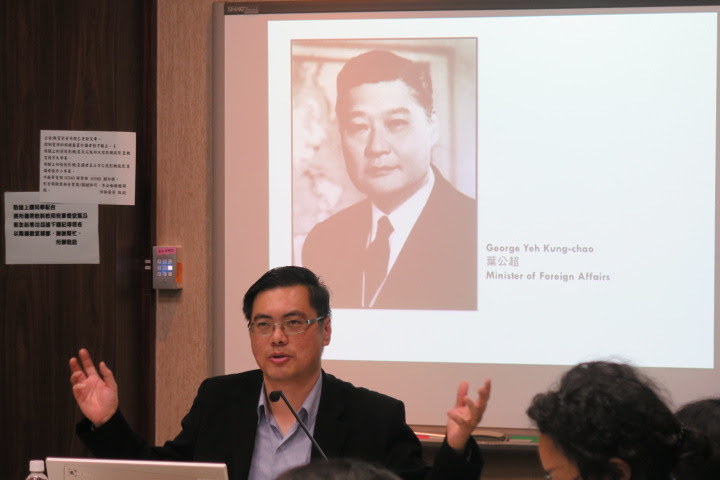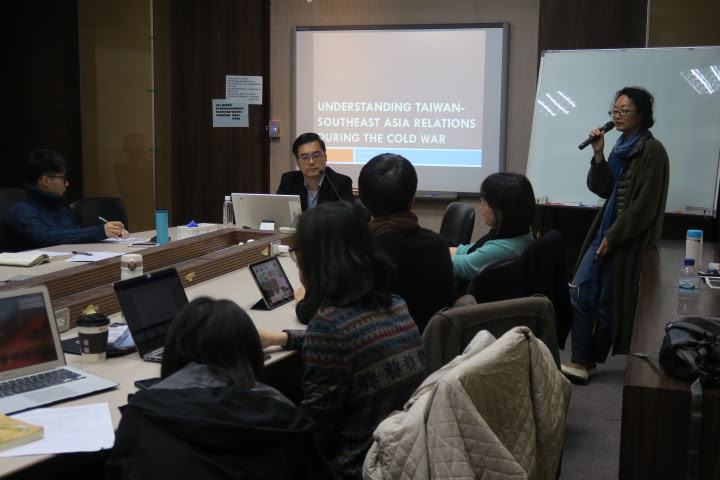

側記 Between the ROC and Southeast Asia during the Cold War: Notes on Jason Lim's talks
2018-12-21
Between the ROC and Southeast Asia during the Cold War: Notes on Jason Lim's talks
/ Show Ying Xin
Professor Jason Lim gave two lectures at National Chiao Tung University on December 12 and 13, 2018, in which he focused on the role the Republic of China (ROC, Taiwan) played in promoting anti-communism during the Cold War through cultural and economic diplomacy in Southeast Asia.
A Singaporean native and a Senior Lecturer in Asian History at the University of Wollongong, Professor Lim has been working on overseas Chinese business history, the history of modern Singapore and Taiwan-Southeast Asia relations during the Cold War. Before becoming a historian, Professor Lim worked as an archivist at the National Archives of Singapore. His research relies heavily on historical archives, and, at the very beginning of both the talks, indicates the origins of sources that he collected for this research project, which include archives at the Academia Historica(國史館), National Archives Administration(檔案局), Institute of Modern History of the Academia Sinica(中研院近代史研究所檔案館), the Kuomintang Party Archives(中國國民黨文化傳播委員會黨史館)and others.
Drawing from the declassified archives, Professor Lim argues that ROC had been closely monitoring the decolonization process in Southeast Asia and the development of the Southeast Asia Treaty Organization (SEATO). Despite that the ROC has never been considered as a real key player during the Cold War and has always been sidelined in the academic studies on the Cold War, Professor Lim argues that it, in fact, had its own agenda in promoting anti-communism in the region, especially through its "soft power".
For example, in 1955, the then Minister of Foreign Affairs Yeh Kung-chao (葉公超) expressed his hope that the friendship between the ROC and South Vietnam could usher in a new area by forming some kind of Asian people solidarity, with Confucianism as its basis. He also called for the creation of a northeast Asian Alliance that included Japan and South Korea, using their common cultural heritage—Confucianism—to defense against international communism. For this, Yeh called the president of South Vietnam, Ngo Dinh Diem, as a “protector of Confucianism”. When Ngo visited Chiang Kai-shek in Taipei in 1960, they signed a joint statement recognizing common culture and tradition of the ROC and South Vietnam. Ngo also promised that Chinese studies would be promoted in Vietnamese universities. In 1958, Kung Te-cheng (孔德成), the descendant of Confucius, paid a visit to Saigon to participate in ceremonies of commemorating the birth of Confucius. The trip was widely reported in the newspapers.
On his second lecture focusing more on the diplomatic ties between the ROC and Singapore, Professor Jason Lim elaborated on the postwar situation in Singapore where the self-governing British colony also tried hard to combat the spread of communism. One of its ways was to restrict the dissemination of publications from communist China. In 1958, imported books from 53 publishers from the mainland were banned. On the other hand, the ROC was keen on maintaining links with overseas Chinese leaders sympathetic to the Kuomintang. In Aug 1957, it invited some Singapore Chinese merchants to visit Taiwan on a trade tour, where they spent 15 days traveling around the island, including Kinmen—the military frontline.
Singapore left Malaysia in 1965 and became an independent nation. The PRC refused to recognize its independence because they saw it as a colonial continuum, but not genuine decolonization. However, the ROC was one of the first countries to recognize the city-state’s independence. The two nations had since been in good, though not official, diplomatic relations, largely due to the personal relationships between Lee Kuan Yew and Chiang Ching-kuo. However, things changed after Singapore established diplomatic ties with the PRC in 1990.
By reconsidering the diplomatic history of the ROC through historical archives, Professor Lim wishes to complicate existing literature in the Cold War studies that focus extensively on the tension between the Soviet Union and the US, and in Asia, the divisions of China, Vietnam, and Korea.


近期新聞 Recent News


